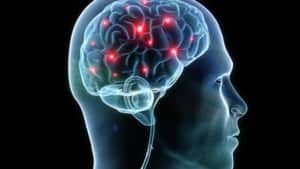Key areas of the brain’s communication system known as synapses expand during waking hours and then shrink by as much as 20 percent during sleep, a new study in mice finds.
The shrinking synapses allow the brain to engage in more learning and development after a night’s sleep, suggest researchers from University of Wisconsin-Madison.
Using precise 3D electron microscopy screening to assess the size and growth of synapses in mice’s brains, the researchers charted a clear pattern of synaptic expansion in mice that were kept awake, and a subsequent size reduction among mice that had slept recently.

They believe that a synapse expands when it is activated during one’s waking hours, and such expansion is a marker for learning and memory.
“This shows, in unequivocal ultrastructural terms, that the balance of synaptic size and strength is upset by wake and restored by sleep,” said study author Dr. Chiara Cirelli. “It is remarkable that the vast majority of synapses in the cortex undergo such a large change in size over just a few hours of wake and sleep.”
Related: The Role Sleep Plays in Processing Traumatic Events
The researchers found that the synaptic slimming affected about 80 percent of the mice’s synapses, theorizing that the remaining 20 percent “may be associated with the most stable memory traces.”
The new study, appearing in the Feb. 3 issue of Science, has important implications for our understanding of the brain’s nighttime activity. “Extrapolating from mice to humans, our findings mean that every night trillions of synapses in our cortex could get slimmer by nearly 20 percent,” said co-author Dr. Giulio Tononi.
Sleep Is Key to Memory, Learning
In a related study in the same issue of Science, researchers from Johns Hopkins Medicine report that sleep is instrumental in learning and memory, according to studies with mice.
The researchers found evidence of a process known as “homeostatic scaling down,” previously thought to occur when synapses weakened. The researchers discovered a 20 percent drop in certain protein levels tied to the scaling down process in sleeping mice, meaning that sleep was literally restoring the brain power of the mice.

“That was the first evidence of homeostatic scaling down in live animals,” said lead author Richard Huganir, director of Johns Hopkins University’s Department of Neuroscience. “It suggests that synapses are restructured throughout the mouse brain every 12 hours or so, which is quite remarkable.”
The new study, which assessed protein levels in the hippocampus and the brain’s cortex region, shows that the brain has its limits to learning — ultimately, it needs sleep to recharge itself.
“Our findings solidly advance the idea that the mouse and presumably the human brain can only store so much information before it needs to recalibrate,” said Graham Diering, a postdoctoral fellow at Johns Hopkins. “Without sleep and the recalibration that goes on during sleep, memories are in danger of being lost.”
The researchers conclude that sleep is vitally important to the functioning of human memory and learning. “The bottom line is that sleep is not really downtime for the brain,” said Diering. “It has important work to do then, and we in the developed world are shortchanging ourselves by skipping it.”
Related: The Sleeping Position That Could Help Fight Alzheimer’s
Richard Scott is a health care reporter focusing on health policy and public health. Richard keeps tabs on national health trends from his Philadelphia location and is an active member of the Association of Health Care Journalists.


![How To: ‘Fix’ Crepey Skin [Watch]](https://cdn.vitalupdates.com/wp-content/uploads/2017/05/bhmdad.png)












